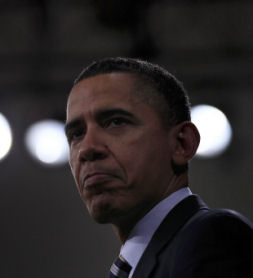Egypt: what can Obama do now?
No one was more surprised than President Obama when his old friend Hosni Mubarak did not stand down as Egyptian President on Thursday night, writes US Correspondent Sarah Smith in Washington.

He had been fully expecting him to leave. Even the head of the CIA had told a Congressional Committee: “There’s a strong likelihood that Mubarak may step down this evening, which would be significant in terms of where the, hopefully, orderly transition in Egypt takes place.”
Barack Obama watched the speech in the conference room on board Air Force One. Afterward a White House spokesman said: “This is not what we expected to happen, this is not what we wanted to happen.”
For the last 18 days much of what’s been happening in Egypt has caught the White House unawares. And the result has been a muddled policy that has tried to support protestors’ demands for democracy but balance those with the interests of America’s other friends in the region.
This is not what we expected to happen, this is not what we wanted to happen. White House spokesman after Egypt’s Mubarak declared he would stay in power
After the first few days the US realized they couldn’t prop up their previously staunch ally Hosni Mubarak. But they couldn’t simply ditch him either. Not when both Saudi Arabia and Israel were warning the White House not to force destabilizing change on the region too quickly. The result has been a muddled policy that is now being criticized in America for not supporting the Egyptian opposition firmly enough.
Just 18 months ago President Obama very deliberately picked Cairo as the venue of a major speech championing the rights of all people to free and fair elections. So once the people answered his call and took to the streets you would think he’d be 100 per cent behind them. But all the talk of the need for “stability” in Egypt has fallen well short meeting the protestors’ demands for Mubarak to go now.
Unacceptable
On Wednesday an angry editorial in the New York Times denounced the US endorsement of the newly appointed Vice-President Omar Suleiman saying “he appears far more interested in maintaining as much of the old repressive order as he can get away with. That is unacceptable to Egypt’s people, and it should be unacceptable to Egypt’s Western supporters.”
In the same paper the next day, columnist Nicholas Kristoff asked: “Why does our national policy seem to be that democracy is good for Americans and Israelis yet dangerous for Egyptians?” He argued that America has found itself on the wrong side of history and as result is strengthening anti-Western elements within Egypt.
Follow the latest in Egypt on the Channel 4 News Live blog
The young people filling Tahrir Square are not Islamic militants and most of them are minded to like Obama and his America. But not if they feel they have been abandoned by the man who came to Cairo to say: “I do have an unyielding belief that all people yearn for certain things: the ability to speak your mind and have a say in how you are governed; confidence in the rule of law and the equal administration of justice; Government that is transparent and doesn’t steal from the people; the freedom to live as you choose. Those are not just American ideas, they are human rights, and that is why we will support them everywhere.”
On Thursday – when he still expected Mubarak to go – Obama said: “We want all Egyptians to know America will continue to do every thing that we can to support an orderly and genuine transition to democracy in Egypt.”
On Friday Egyptians will want to know what Obama is going to do to support them now that Mubarak will not, voluntarily, give them that transition just yet.
-
Latest news
-
Laughing Boy: New play tells the tragic tale of Connor Sparrowhawk5m

-
Sewage warning system allows some of worst test results to be left off rating system, analysis shows3m

-
Post Office inquiry: Former CEO didn’t like word “bugs” to refer to faulty IT system4m

-
Israeli soldier speaks out on war in Gaza12m

-
PM’s defence spending boost should be ‘celebrated’, says former Armed Forces Minister4m

-




